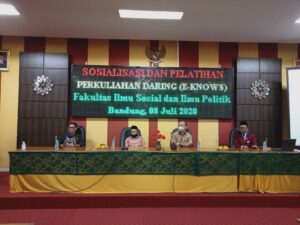The CASSR International Seminar on Higher Education in Post-COVID 19: Challenges and Opportunities for Islamic Higher Education in Indonesia was conducted online at 26 October 2022. Two speakers were invited to deliver talks about the issue: Megan Hewitt, Ph.D. and Dani Muhtada, Ph.D.
Megan Hewitt, the executive director of AIFIS (American Institute for Indonesian Studies) based at Cornell University, USA, talked about the AIFIS activities and collaborations in Islamic higher education in Indonesia. AIFIS has been running four main agenda since 2013: Collaborative seminars and symposia, academic writing workshop, research fellowship, and conferences. It works in collaboration with Indonesian Islamic scholars and institutions. To this day, AIFIS has works with more than 37 Islamic higher education institution across Indonesia, conducting more than 50 events. AIFIS programs aim to create the meeting point of many disciplines and institutions so that greater connections are made between Indonesian and American networks of scholars.
However, as Hewitt said, numerous AIFIS programs during COVID-19 pandemic were disrupted as they were postponed due to the lockdown. For instance, the research programs conducted in Indonesia were cancelled as the Indonesian government closed its border. Nevertheless, COVID-19 created new opportunities. Through the advancement of the use of technologies during pandemic, AIFIS was able to expand networks and reach areas that were once unreachable. Thus, it has shown agility in working with strategies to continue its program.
The second speaker, Dani Muhtada, a senior lecturer from State University of Semarang, talked about the challenges and opportunities aroused during and post COVID-19. The pandemic has had an immense impact on education in Indonesia. The Indonesian government issued emergency policies at schools in various impacted areas. Schools and universities need to quickly adjust to the situation and prepare teachers, staffs, and students to new process of learning. Challenges and issues aroused in many different aspects, especially the use of internet-based technologies: senior lecturers face with difficulty in adjusting to technology; students have poor understanding of the learning material delivered online; the expenses of continuously using the internet; the physical and psychological effect of watching screens for long period of time; and the unequal internet access.
However, according to Muhtada, COVID-19 is a “blessing in disguise”. The higher education sector is able grow and use the challenges as opportunities to learn and adapt quickly. The use of technologies has created a support for lecturers and students as they have more access to learning resources. Universities are now equipped with advance technologies that can support learning activities. Reports show that lecturers now prefer online learning than offline one. Nonetheless, new challenges in post-COVID-19 are still arising. Thus, it is important for universities to be adaptable and agile to cope with post-COVID-19 challenges and create a better solution for the future. [farah; ami].


